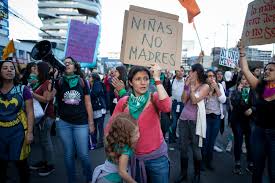- About
- Topics
- Picks
- Audio
- Story
- In-Depth
- Opinion
- News
- Donate
-
Signup for our newsletterOur Editors' Best Picks.Send
Read, Debate: Engage.
| topic: | Abortion |
|---|---|
| located: | Brazil |
| editor: | Ellen Nemitz |
The slogan in the headline of this article is a reproduction from its original version in Spanish, "Niñas, no madres", a campaign created in Latin America against the maintenance of precocious pregnancies, most of the times resulting from rape and sexual abuse. This is what recently happened to a little Brazilian girl who, after four years of being abused by an uncle, got pregnant at the age of 10. The abortion would be the only possible way to minimally restore her childhood, giving her back the possibility of studying and playing. In Brazil, the law is on her side, as a pregnancy interruption is permitted in three cases: rape, risk of life to the mother and the unviability of the fetus by anencephaly.
However, sustained by a deepening conservative context, fanatic religious groups led the case until extreme protesting took place in front of the hospital – the only hospital that accepted interrupting the non-viable pregnancy, miles away from her home city. In the end, after facing furious demonstrators and an 'internet trial' – even her name and address were criminally exposed – her pregnancy was terminated, but the trauma will remain forever.
This girl is not alone, unfortunately. It is hard to measure the exact number of victims due to underreporting, but Latin American countries' authorities are notified of thousands of child sexual abuses every year, most of which are affecting young girls and happening inside the victim's home. According to the Niñas, no madres’ website, Latin America and the Caribbean are witnessing a unique increase in the number of young girls giving birth, a result of "high rates of sexual violence, followed by lack of access to essential health services and multiple violations of girls' human rights.”
Although sexual abuse is a worldwide problem, there seems to be a correlation between democracy and childhood protection, according to a report 'Out of the Shadows Index'. In it, the report highlights that ”Given the negative repercussions that stigma and a lack of open discussion about sex, children’s rights and gender can have on a country’s ability to address sexual violence against children, the Democracy Index’s emphasis on freedom of expression and association is indicative of attitudes that are conducive to protecting children.”
Already not figuring among the best on childhood protection, Brazil is facing an extremist evangelical wave, mostly represented by the fervent evangelical Minister of Woman, Family and Human Rights (and by "family" understanding a heteronormative one) Damares Alves, which can hit the foundations of recent legislation pro-children.
The dubious morality of the “Brazilian traditional family” can condemn a raped girl and forget about the rapist – the abusers, frequently older men close to the victims, often remain under impunity. Religious leaders, religious fanatics, political extremists, even part of the media, all decided to focus on the girl, trying to define her future of being a 'mother' – if this is possible for a kid as young as 10 years old – ignoring the protection she still needs from her own parents, relatives and from the state.
This girl was saved. By gathered women, by her grandmother, by the doctor who did the procedure, by the real religious committed to whatever god they believe in, more than to churches and a false morality. Others are not. Everyday young lives are lost or completely destroyed by a blind society. How long?
Image by Boris Gonzalez

